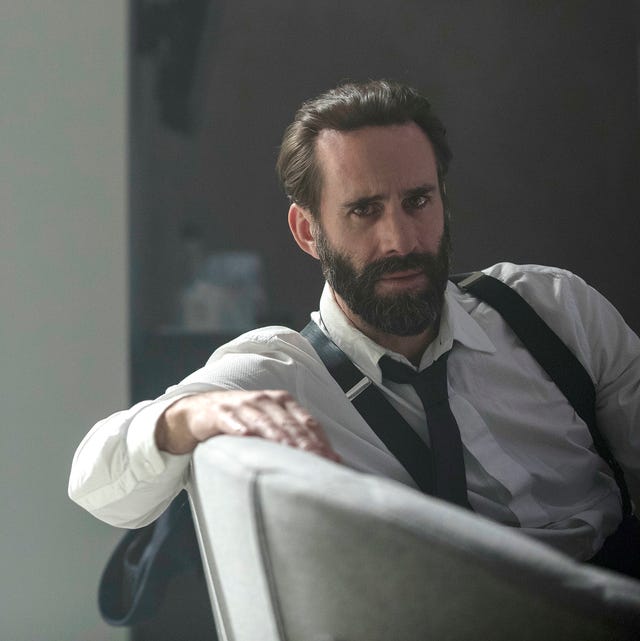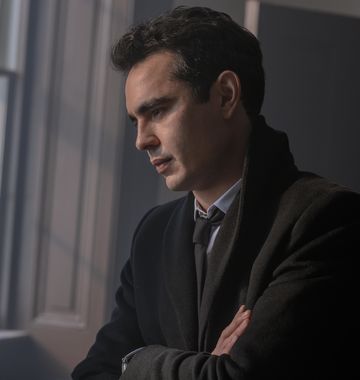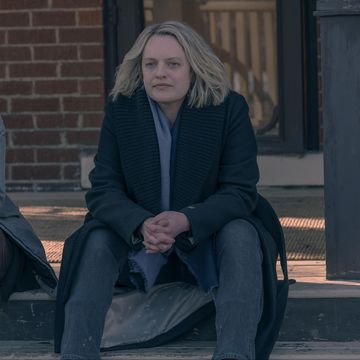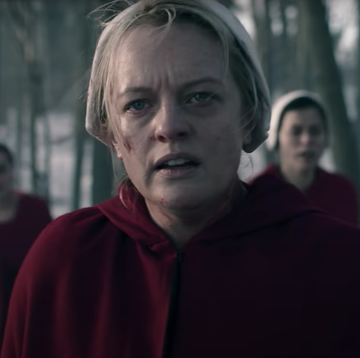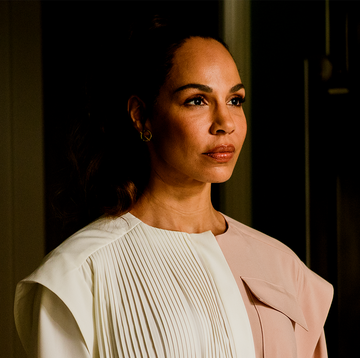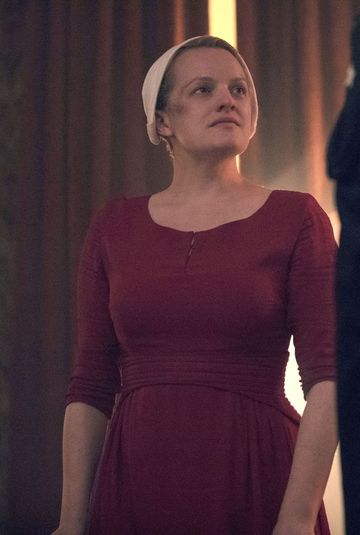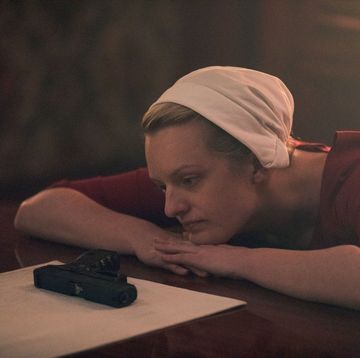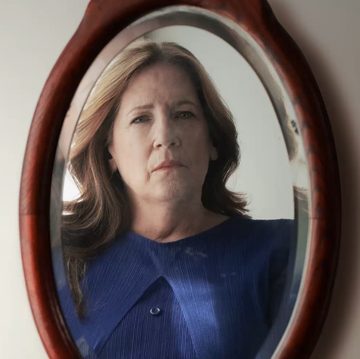After three seasons of near-invincibility, Fred Waterford finally got his long-overdue comeuppance in last week's episode of The Handmaid's Tale. It’s been undeniably satisfying to watch Fred's authority gradually diminish in small ways this season—June's "At least it wasn’t you" back in Episode 10 got a round of applause from me—but it was even more gratifying to watch him slapped into handcuffs and marched off to jail by police at the Canadian border.
The revelation that Fred's downfall comes at the hands of his wife, Serena (Yvonne Strahovski), makes this cathartic moment that much sweeter. She's been playing him like a fiddle, and in the latest episode, "Sacrifice," Fred learns Serena orchestrated his arrest, giving him up in exchange for the promise of visitation with Nichole.
Below, Joseph Fiennes digs into Fred's abusive relationship with Serena, his confrontation with Luke, and that ambiguous predatory dynamic with Christopher Meloni's now-deceased Commander Winslow.
Fred's comeuppance at Serena's hands has felt like a long time coming. As the actor playing him, did you feel the same way?
From the book, I knew he'd come to some kind of demise, but I wasn't sure quite how his downfall would play out. He's certainly done enough damage that he deserves to be constantly looking over his shoulder. All season, he's been dragging Serena along with this promise of Nichole and of a family, while actually being seduced by the idea of power and the political game in Washington, D.C. He's trying to have his cake and eat it.
At the same time, when they're on that road trip, I think he really does want to win Serena back. When they come to that eco-house in the village, this represents their fucked-up idea of a Gilead utopia, and Fred in that moment genuinely believes, "Actually, we could just settle here, and I could go without pursuing yet more power." But in reality, I don't think he ever can. Fred's so used to being in a position where he's allowed to feel more powerful and intelligent than he really is. I don't think he could ever deal with a reality where he doesn't have those trappings to elevate his ego.
He underestimates Serena too. Even after everything he's done to her, he never imagined she could turn on him.
He's too wrapped up in his own egotistical world of control to contemplate it. She does a great job of convincing him too. For her to allow him back into bed is a signal, in his mind, that he's won her back. They haven't had physical relations for quite some time, and once they'd re-consummated their relationship, he was hoodwinked. He was completely blindsided by [the arrest]. And good! We need that moment of satisfaction!
I think he's really crippled and devastated by it on many levels, by the betrayal but also that he doesn't know his wife. Part of the abuse is that he thinks he knows her inside out, and can win her back and manipulate her with the baby. He's such a controlling little fuck that the idea that he doesn't really know his wife is unbearable.
He clearly has no remorse about his role in Gilead or his treatment of the Handmaids, but does he feel any remorse for how he's treated Serena? There are hints of that in Episode 11, but it's hard to tell how genuine he is.
I think it's like a lot of abusive relationships, heightened by this awful reality of being in a place like Gilead where he will always be welcomed back. In this awful theocracy, he can use scripture, and the word of God, in order to justify his pathetic, evil, patriarchal violence, and try to convince Serena that she's wrong to want a husband who treats her better. That she's wrong to advocate for women to read and write. There's nothing he can't justify to himself.
Fred shows absolutely no humility when Luke confronts him, and actually ends up taunting him about how he's "changed June." What's going on for Fred in that interaction?
He's so used to these trappings of authority—the desk, the double-breasted suit, the committees, the power—that he feels slightly affronted by Luke in that scene, by his forceful presence. He can't help but taunt him. Also, I think Fred genuinely does feel that June has changed, just through being brutalized and being forced to evolve in a way that might reveal an uglier part of her persona. Fred is cognizant of that, and off the back of Luke saying, "You're gonna rot in this jail knowing your wife betrayed you," he can't resist turning it back on him. The message is, "Yes, I didn't know Serena could deceive me in this way, but if you meet your wife again, Luke, she may not be the person you once knew either." It's both an honest response to the question and a taunt.
And he has this weird possessive thing with June, where he clearly likes the idea that he's made his mark.
Which is all part of the Gilead philosophy, this ugly sense of ownership over Handmaids. I also think strong women have an effect on Fred. He's drawn to them, because he's so pathetic in his own nature. And when the strong women rear up too much, he tries to find a way to smack them back down again.
There’s a homoerotic subtext to Commander Winslow's behavior toward Fred, which is fascinating to watch, because for the first time, Fred is in the position of being made to feel pursued and uncomfortable. What was your take on their interactions?
I thought it was genius, and I wish we had opened up that narrative a little bit more. I loved the idea that Fred gets a taste of what it is to have a predator move on him. Chris Meloni brilliantly developed this power-hungry, black-hole energy that could move any which way he wanted. He's got this corruptive sense of power, and there's an unanswered question of how far would Fred have allowed it to go. The ambiguity of it was delicious: Is this guy putting his hand on me for a little bit too long? We talked a lot about how to do it, because originally, it was putting his hand on his lap or something, and we went around and discussed it a lot with Dearbhla Walsh, our director on that episode. We ended up liking the more ambiguous version, and I found it so brutal and deeply subversive and something that Fred needed to taste a bit more of.
